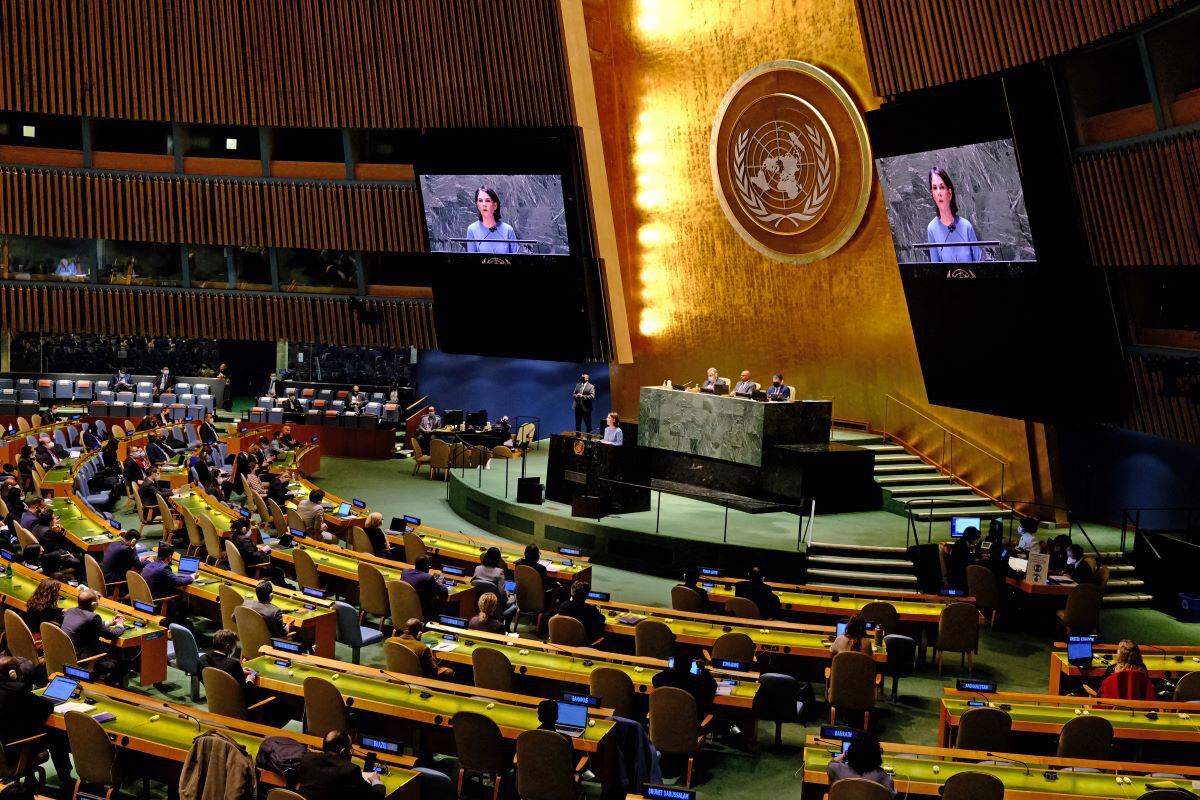
With a large majority, the UN General Assembly approved on Wednesday a resolution condemning the invasion of Ukraine, while demanding a withdrawal of Russian troops from Ukrainian territory.
Of the 193 member states of the United Nations, 141 supported the text, while only five voted against it: Russia itself, Belarus, Syria, North Korea and Eritrea.
Those who opted for abstention were 35, including three of the four powers that, along with Russia, make up the bloc known as BRICS (China, India, South Africa and Brazil) and which brings together the world’s large emerging economies.
Brazil was the only one that voted in favor of the resolution, even considering “indiscriminate” the sanctions imposed on Russia.
Caution characterizes the position of these countries, which represent 40% of the world economy.
China, a delicate balance
China has reiterated that it supports the continuation of negotiations between Russia and Ukraine to “resolve the conflict”, but has avoided specifying what role Beijing could play as a mediator to reach a ceasefire.
He has maintained an ambiguous position regarding the conflict in Ukraine, in the face of which he insists both on “respect for the territorial integrity of all countries” and on the attention that must be paid to “legitimate security demands” by Russia. .
The Russian invasion of Ukraine has put the country in a delicate situation since, although it sympathizes with Russia’s anti-Western line, its economy has begun to show signs of slowing down and its exports depend more on Europe than on the Kremlin.
Yesterday, he justified his abstention by arguing that the resolution did not take into account the entire context of the conflict, in addition to alluding to Western policies against Russia.
“We ask relevant parties not to harm China’s legitimate interests as we deal with the situation in Ukraine and our relations with Russia,” the spokesman said.
Brazil keeps distance
Since the beginning of the Russian attacks against Ukraine, the Brazilian government has tried to maintain a certain diplomatic distance on the conflict
But the Russian invasion has generated crosses of declarations within the government of President Jair Bolsonaro, in some cases contradictory, although the line of the head of state has finally been imposed, defending a position of “caution” and “neutrality”.
In the first reaction of the Ministry of Foreign Affairs, and in the midst of Bolsonaro’s silence, the Brazilian Foreign Ministry defended the start of negotiations “that lead to a diplomatic solution”, taking into account “the legitimate security interests of all the parties involved. ”.
He also underlined “the principles of non-intervention, sovereignty and territorial integrity of States and the peaceful settlement of disputes.”
The most critical position was taken by the Brazilian Vice President, Hamilton Mourao, politically distanced from Bolsonaro, who was clearly in favor of the “use of force” in support of Ukraine.
“If the Western world just lets it fall to the ground, next it will be Bulgaria, then the Baltic states and so on, like ‘Hitler’ Germany did in the 1930s,” General Murao said.
Brazil’s powerful agricultural sector relies heavily on fertilizers from Russia, and the conflict comes at a time when large producers have not yet stockpiled fertilizer for the next harvest, according to industry sources.
“Without fertilizers we lose productivity and we will have a lower production and then how is our agriculture, which is the locomotive of our economy? How is food security?” the far-right ruler recently said.
India maintains a strategic neutrality
India, maintaining its position of neutrality, affirmed this Thursday “to be closely observing the situation in Ukraine” after the invasion of Russian troops, avoiding condemning the action of a strategic ally in terms of defense and military equipment.
Relations intensified between the two countries last December, in which the Indian Prime Minister, Narendra Modi, and Vladmir Putin met at the 21st India-Russia bilateral summit, in which they reinforced their position as allies in terms of arms. .
“We express our deep concern about developments that, if not handled carefully, may undermine peace and security in the region. We call for immediate de-escalation and refrain from any action that contributes to worsening the situation”, commented the Indian permanent representative to NATO, TS Tirumurti.
South Africa says UN condemnation hampers dialogue
South Africa, a nation allied with Russia in the BRICS bloc, explained that on Wednesday it refrained from condemning the invasion of Ukraine at the UN General Assembly because the proposed resolution did not create “a conducive environment” for dialogue.
For the UN Assembly, the South African Executive Mathu Joyini, opined that “unfortunately”, the resolution was not being used “as a platform to build bridges”.
“While we agree with and support the efforts made by member states to draw the international community’s attention to the situation in Ukraine, South Africa believes that more attention should have been paid to fostering dialogue between the parties,” Joyini said. who also expressed his country’s willingness to “continue working together to promote peace” beyond “gestures.”
South Africa already asked Moscow as soon as the Russian military invasion took place, on February 24, “to immediately withdraw its forces from Ukraine”.
Source: Gestion
Ricardo is a renowned author and journalist, known for his exceptional writing on top-news stories. He currently works as a writer at the 247 News Agency, where he is known for his ability to deliver breaking news and insightful analysis on the most pressing issues of the day.












